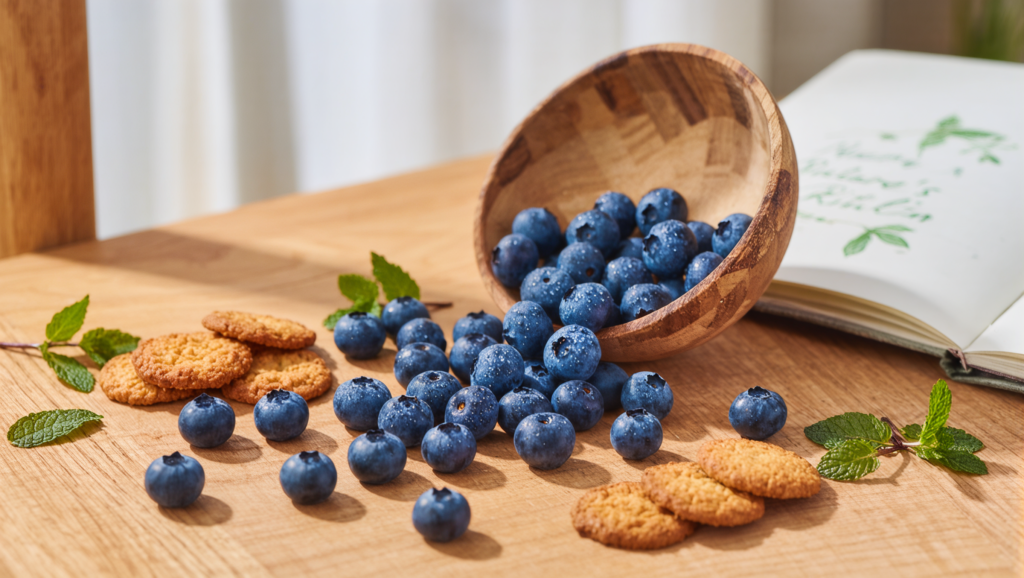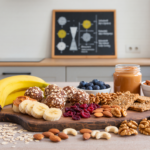Blueberries have steadily climbed the “superfood” charts—celebrated for their antioxidants, brain-boosting powers, and ability to fight aging. But among wellness insiders and researchers, a new nickname is catching on: Nature’s Ritalin. That’s right. Organic blueberries are being compared to the famed ADHD and focus medication—not for their stimulants, but for their impressive, science-backed ability to supercharge memory, attention, and cognitive performance. Let’s dig into the research, explore how organic makes a difference, and see why these powerful little berries might be the most delicious strategy for sharper focus at every age.
The Brain Science: Blueberries and Cognitive Power
1. Blueberries Improve Memory and Learning
Multiple studies have shown that blueberries, especially wild and organic varieties, are rich in anthocyanins and flavonoids—plant compounds that can cross the blood-brain barrier and support cognitive function. These compounds activate important signaling pathways crucial to learning and memory, and promote neurogenesis (the creation of new neurons).
Recent studies in older adults found that even a handful of blueberries daily led to improved memory, sharper reasoning skills, and better decision-making. For example, a 2023 clinical trial found that older adults who consumed wild blueberry powder daily for 12 weeks saw marked improvements in memory accuracy, mental flexibility, attention, and even lowered blood pressure—benefits seen from a single dietary tweak.
2. Boosting Attention and Processing Speed—In Kids and Adults
What about focus and attention, the very things Ritalin is designed to help? Research on children shows that blueberry supplementation significantly improves executive function, working memory, and—most relevantly—attention span and reaction time.
A double-blind UK study found that kids consuming wild blueberry drinks performed executive attention tasks 9% faster with no loss of accuracy. The tougher the cognitive challenge, the greater the boost from blueberries compared to placebo.
In another study, children and adults both experienced improvements in short-term memory, accuracy, processing speed, and mood within hours of consuming blueberries.
3. Why the Organic Advantage?
Why does organic matter for brain health? It comes down to two factors: richer nutrient density and less neurological pesticide exposure.
- Organic blueberries are proven in head-to-head studies to contain up to 50% more anthocyanins and 67% more total phenolics compared to conventional berries. These polyphenols are most responsible for the neurological and cognitive effects described in brain studies.
- Conventional blueberries are among the fruits most likely to contain multiple pesticide residues, including organophosphates like malathion. High exposure is linked to elevated ADHD risk, learning problems, and slower brain processing in children; organic berries virtually eliminate this risk.
How Blueberries Stack Up Against Ritalin
Ritalin (methylphenidate) is one of the world’s most prescribed medications for improving attention and reducing impulsivity in ADHD. While it works via targeted neurological stimulation, blueberries enhance focus, memory, and learning through broad molecular support—improving neuron health, promoting new brain cell growth, encouraging antioxidant protection, and ramping up communication between brain regions.
Key similarities:
- Both sharpen attention and improve executive function.
- Both are clinically shown to speed cognitive processing and reaction times.
Key differences:
- Blueberries do not have stimulant or addictive properties; they work by supporting overall brain health.
- Blueberries lower inflammation and oxidative stress, contributing to long-term cognitive benefits.
- Blueberries supply extra nutrients (fiber, vitamin C, manganese, etc.) for overall health.
Other Brain-Boosting Benefits of Blueberries
- Reduce age-related cognitive decline: Regular blueberry intake slows mental aging and reduces dementia risk.
- Decrease risk of neurodegenerative diseases: Blueberry flavonoids support brain repair and may guard against Alzheimer’s and Parkinson’s disease.
- Boost mood: Some studies link blueberry consumption to improved mood and less anxiety—benefits that build with daily intake.
- Aid functional mobility in aging adults: Consuming blueberries twice daily improved mobility in older adults, a sign of better brain-muscle communication.
Organic Blueberries: The Pesticide Problem
The Environmental Working Group consistently lists conventional blueberries high on its “Dirty Dozen” for pesticide contamination. Over 50 pesticide residues have been found, including neurotoxic organophosphates. Studies published in major health journals found that kids exposed to more pesticides have a significantly higher risk of ADHD and other attention disorders.
Choosing organic blueberries isn’t just about antioxidants—it’s about reducing exposure to chemicals that can undermine the very brain pathways we’re trying to support.
How Much to Eat for Focus and Memory?
Most cognitive nutrition studies use the equivalent of 1–2 cups (about 150–300g) of fresh wild or organic blueberries per day. Benefits can be seen within hours (short-term boosts) and accumulate over weeks (long-term support), especially for attention, memory, and mood.
Top ways to eat organic blueberries for sustained focus:
- Add to oatmeal, yogurt, or smoothies in the morning.
- Snack on them plain, or freeze for a cool treat.
- Toss in salads, top pancakes, or blend into homemade fruit bars.
The Bottom Line: Nature’s Ritalin Is Real, Delicious, and Safer
Organic blueberries are not a “drug,” but their astonishing brain benefits are real and robust—backed by multiple clinical trials and increasingly recommended by neurologists and psychiatrists.
They sharpen focus, speed reaction time, boost memory, and protect the brain from toxins and aging. By choosing organic, you maximize those effects while sidestepping pesticides that sabotage brain health.
For kids, students, professionals, or seniors—eating a cup or two of organic blueberries a day is the simplest, tastiest way to get a brain boost that rivals anything the pharmacy offers.








